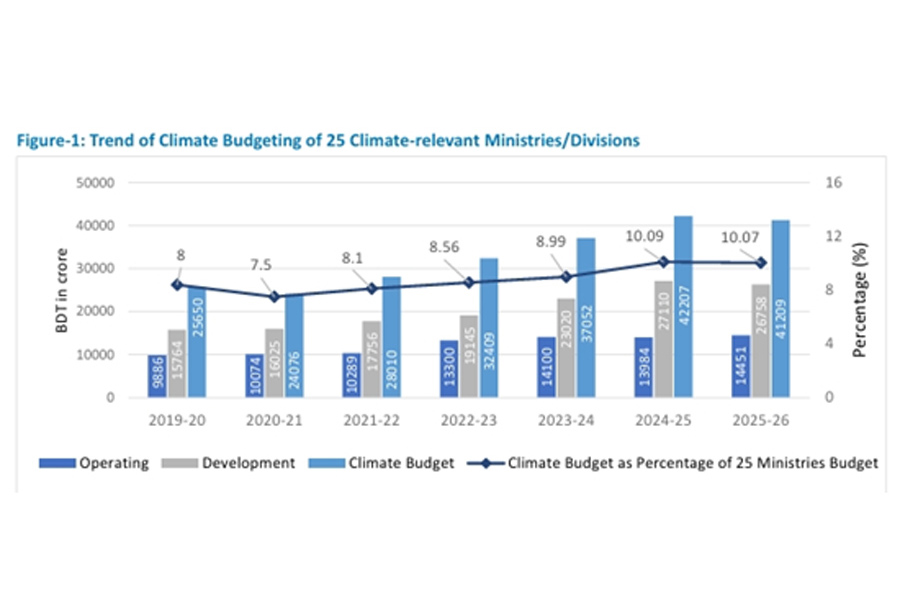More than 52 per cent of the total budgetary allocation has been earmarked for 25 key ministries and divisions in Bangladesh for the 2025–26 financial year (FY26) that are involved in climate change initiatives, according to the Finance Ministry’s newly released Climate Financing for Bangladesh report.
Of this, 10.7 per cent is specifically allocated for climate-related initiatives, reflecting the government’s heightened commitment to addressing climate risks.
The report states that a total of Tk 4.09 trillion has been allocated to the 25 climate-relevant ministries and divisions in the FY26 national budget. Of this amount, Tk 412 billion has been designated solely for direct climate action.
Among the six thematic pillars of the Bangladesh Climate Change Strategy and Action Plan (BCCSAP), the largest share of climate financing goes to food security, social protection, and health, followed by infrastructure, and then mitigation and low-carbon development, the report notes.
The report also highlights strategic frameworks and funding sources such as the National Adaptation Plan (NAP), Nationally Determined Contributions (NDCs), and the Green Climate Fund (GCF) as guiding instruments for climate investment. These mechanisms play a vital role in building climate resilience and promoting sustainable development.
A key objective of the report is to promote transparency and inclusiveness in climate financing by showcasing the government’s resource allocation strategies for climate risk management. It underscores the administration’s readiness to build a climate-responsive economy and its dedication to sustainable development goals.
Syeda Rizwana Hasan, adviser to the Ministry of Environment, Forest and Climate Change, said that Bangladesh remains on the frontline of the global climate crisis.
“Despite our negligible contribution to global greenhouse gas emissions, Bangladesh faces extreme vulnerability to rising sea levels, recurrent cyclones, floods, and heatwaves,” she said.
“As we pursue national development, climate finance has become indispensable—not only to protect our achievements but also to boost resilience.”
Dr. Md Khairuzzaman Mozumder, Secretary of the Finance Division, stated that in response to growing climate threats, Bangladesh has developed a comprehensive policy framework including the NDCs, BCCSAP, and NAP.
While these frameworks are visionary and robust, their implementation depends heavily on access to timely, predictable, and adequate climate finance from both domestic and international sources.
Bangladesh has shown leadership by establishing domestic financing mechanisms such as the Bangladesh Climate Change Trust Fund (BCCTF) and actively engaging with international climate funds like the GCF.
“Yet, the scale of investment needed far exceeds current flows. Bridging this gap will require enhanced international support, stronger public-private partnerships, and innovative financial instruments tailored to local contexts,” he said.
However, cyclones are becoming increasingly frequent in the Bay of Bengal due to global climate change, causing massive losses of lives, crops, livestock, fisheries, and infrastructure in Bangladesh.
The country witnessed five cyclones during the 2023–2024 period, with the latest, Cyclone Remal, wreaking havoc along the coastal belt in May 2025.
Meteorologist Dr. Sadequl Alam says data from the past 64 years clearly shows that cyclones have become more frequent in the Bay since the turn of the millennium.
Since 1960, Bangladesh has experienced over 49 cyclones, 20 of which occurred since 2007. Devastating cyclones during this period include Sidr, Aila, Fani, Mahasen, Amphan, and Remal.
Prof. AKM Saiful Islam of the Institute of Water and Flood Management at Bangladesh University of Engineering and Technology told The Financial Express that ocean temperatures have been rising due to global warming.
A cyclone forms when the average sea surface temperature exceeds 27 degrees Celsius, he said, noting that the Bay’s temperature is now 31 degrees Celsius.
He further explained that the Indian Ocean has been warming faster than other ocean systems, which poses additional risks for Bangladesh.
Prof. Islam added that the average land temperature has increased by 1.1 degrees Celsius, while the sea temperature has risen by 1.0 degree Celsius.
“Cyclones will now occur more frequently,” he forecasted, adding that the country must adapt its financial and development policies accordingly.
As global climate change is largely driven by developed countries, Bangladesh has the right to seek compensation through global climate funds, he argued.
He noted that the United Nations adopted a loss-and-damage fund at COP28 in Dubai, which was further expanded at COP29 in Azerbaijan last year.
tonmoy.wardad@gmail.com
Let me know if you need a headline rewrite or a shorter version for publication.

